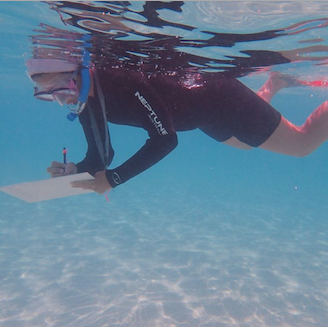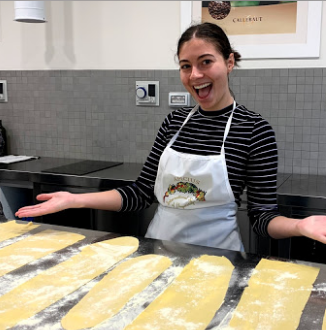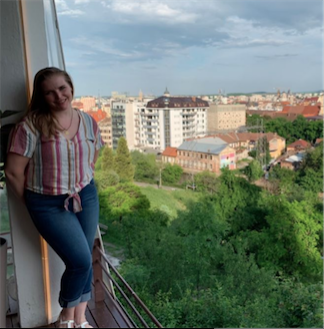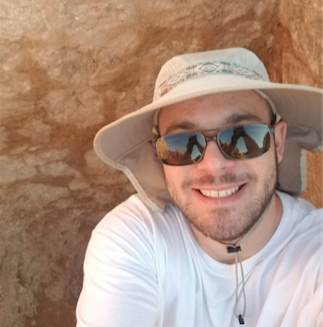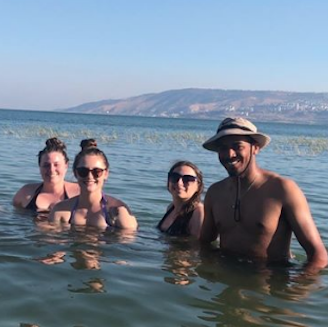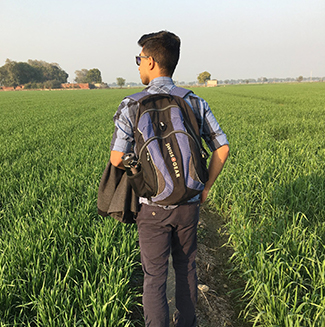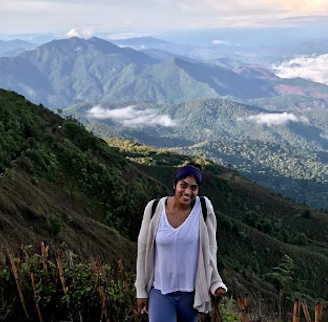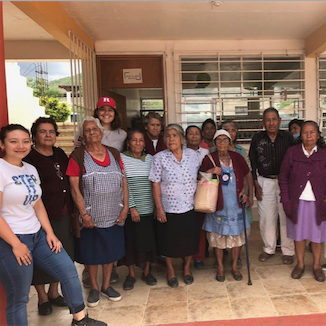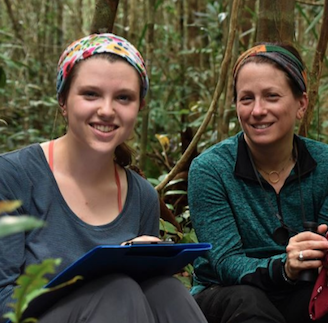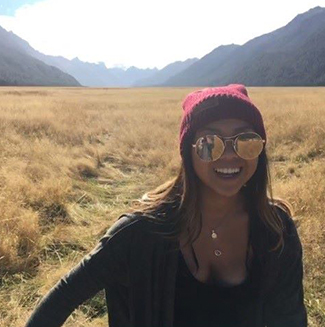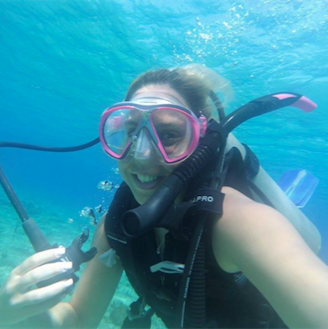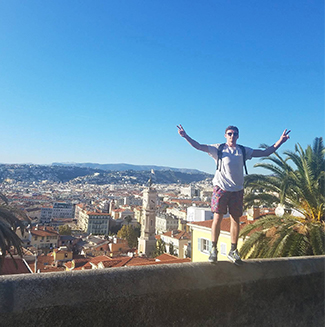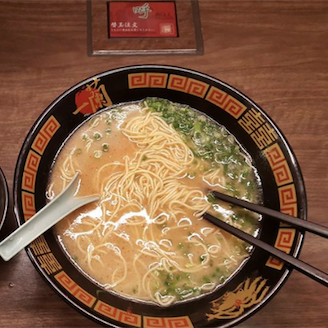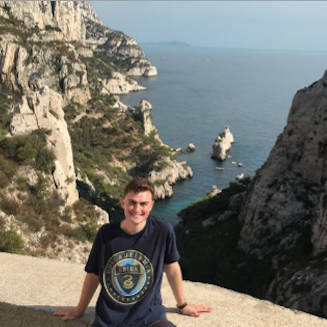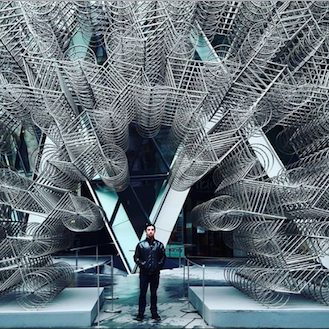- Rutgers
- Study Abroad
- first column
- Student Stories
- Stories About Academics
+ Stories About Academics +
“While on the island I had some free time that I used for two of my favorite activities: snorkeling and diving. When snorkeling I was able to see so many marine animals such as reef sharks, sea turtles, stingrays, fish and many more. When I went to dive at the Great Barrier Reef I felt so happy; I could not believe my dream was actually coming true. The most incredible part was all the life that is present around the colorful corals. In those experiences, I learned so much about the interactions between marine animals and reef environments. Not only that, but also about human impact on them. I look forward to [continuing to learn] about it, so that I can help them in the future with my career.”
"My classes in Florence were much smaller than at Rutgers, and also structured very differently. The structure of Florence University of the Arts itself is very different from Rutgers. I was able to have closer relationships with my professors and have more of their undivided attention. I was also not confined when it came to my class choices and, therefore, I was able to study in various different departments. I was able to take classes that I would not have been able to at Rutgers, such as a painting class and nutrition course. I was also able to learn about Italian history and culture through a short immersive course at the beginning of the semester entitled 'Cultural Introduction to Italy.'"
I applied to the summer study abroad program through the School of Social Work to Romania in order to spread out my workload. The program in Romania allows for you to complete one semester’s worth of field work hours abroad in one month. As a graduate student working full time while attending school, this was exactly the opportunity I needed to succeed. Completing half of my field work hours during the summer will allow for me to spread out my field work hours. However, what I did not realize at the time of my application was that Romania was going to give me so much more than just field work hour time.
The last time I was away from home, or, at least, out of the country for so long was junior year of undergrad, when I studied in Edinburgh, Scotland for 6 months. I didn’t think when I’d gotten into Rutgers-Newark for graduate school that I would ever have the opportunity to do something like that again. I was extremely excited when I was informed of the Archaeological Field School in Vacone. The Newark History department is primarily American history focused, and as someone who loves Ancient History, especially Roman Imperial history, the opportunity to learn valuable archaeological skills, and discover something new, in situ, about Roman history was too good to pass up. However, this time presented new and different challenges. While my time in Scotland was structured like a traditional educational program—I lived in an apartment, I went to classes, I had daily homework assignments, and essays and exams—this field school was unlike anything I had ever done before.
The service-learning component of our study abroad trip was exceptional. As social work students, we were able to understand the religious diversity in Israel, its sociopolitical structure, its history, and the current social conflicts. We were able to visit different social groups such as the Bedouin women, a Kibbutz community that lives near the Gaza border, an immersive art community, and many others. This provided us with a lens through which we could understand the challenges of having such a culturally and religiously diverse country and the conflicts that arise due to that. I was also able to observe what it was like to live somewhere where there is a potential threat of war at any time and the precautions the country and its citizens have adopted to face it.
"Taught by Dr. Satyanarayana Das, the Hinduism course gave an insider look to one of the oldest religions in this history of mankind. Dr. Das provided an objective approach and facilitated learning through relatable examples and interesting videos. To supplement class lectures, we were required to write short response papers connecting our experiences to literature being addressed in class. The daily excursions helped us interact directly with the culture being addressed in class as we visited premodern and modern temples, significant holy sites, and the Taj Mahal. In addition, we were invited as guests for a VIP concert and dance performance, ending the trip off with a bang. My favorite experience was when we visited the Taj Mahal. In all its grandeur, the monument stuns and amazes at first sight."
"This trip also made me certain that I have chosen the right major. Holding tarantulas, hiking up steep muddy terrain, inspecting insects, and catching frogs and bats certainly does not sound like a good time to everyone. However, I couldn’t get enough of it. I had so much fun identifying different plant and animal species with our guides and using my binoculars to try to catch a glimpse of different tropical birds. I have learned so much about biology and sustainability through this experience. Although this study abroad program focuses on biology, I was also glad that our professor included many cultural expeditions as well. It’s important to explore all aspects of a place– and to take your blinders off once in a while. I loved that we learned about Ecuadorian rituals, traditions, and daily life."
I have had some time to reflect on all that I experienced and I can without a doubt say that it was one of the best opportunities Rutgers has given me. My biggest motivation for traveling abroad was that I have been to several countries and absolutely love exploring new places, but given my field of study, I didn’t think studying abroad would be possible during my undergraduate career. However, when I found out there was a health-oriented program in Thailand, a country I have always wanted to visit, I knew it was the perfect program for me. Since it took place over the summer, I was still able to manage all my academics during the semester, so I met with advisors to finalize my scholarships and transfer credits, and before I knew it, I was on my way to the capital city of Bangkok.
The Culture and Community Health Program affected my life in such an amazing way and I’m so lucky to have had the opportunity to be a part of it. The program focused on health, culture, community, and community service. The clinic and Casa de Dia (adult day care) I worked at was very underfunded and relied on donations and volunteer work. Without outside help, these care facilities wouldn’t exist. At the Casa de Dia, I met a woman who shared with me that she never went to school. She never had the opportunity to learn how to read or write. Although my Spanish is better than my reading or writing, I was still lucky enough to have learned. A new friend of mine from the program and I offered to help the woman and she was so grateful and excited. I realized then that I was here for a reason and that if I can help this woman then what was stopping me from helping so many others?
Summing up my experiences in Indonesia in such a short space will be quite a challenge since everyday there was filled with monumental moments. But, if I had to pick out something that tied each day to the next and impacted me throughout the three weeks and since I’ve returned, it would be the passion for research, conservation and the world around them that each new person I met exuded. From our own Dr. Vogel, leader of the trip and 15+ year researcher in the jungles of Borneo, to the Indonesian born research assistants, the multiple conservation efforts we were privileged enough the witness simply couldn’t continue without the work of these people.
"I'm taking only four courses while I'm here. I'm taking one seminar that talks about Contemporary Australia and another course called Australian Pop Culture. I'm excited to learn more about the culture and history here. The other two courses are for my major. The lectures here are a lot shorter than the ones at Rutgers, which I prefer. Courses here are also broken into lectures and tutorials. Tutorials can be equivalent to recitations at Rutgers. They're smaller classes so you can have more of an engaging discussion about your course."
When I realized that Rutgers had a coral reef internship program in the Cayman Islands, there was no doubt that I had to apply. I expected this internship to teach me all about corals and its conservation, but I learned so much during this internship along with other surprises; therefore this experience has exceeded all my expectations. Before this trip I was a little concerned about my diving skills. It had been more than three years since I haven’t dived, therefore I would consider this to be my biggest challenge. Fortunately our first two dives were skill and buoyancy dives which allowed us to practice our skills underwater. After those dives everything ran smooth and beautiful and I felt like I was part of the ocean.
"One of the best surprises of study abroad was how smoothly the program fit in with my ongoing education. The transition to and from my school in Berlin was as simple as any other semester at home. Both in terms of finances and credits, it was basically like I was still going to school at Rutgers, but living in Berlin. This really made the whole experience that much more worth it, knowing that I was able to travel and experience another part of the world, while continuing my education and working towards my degree."
My time at the International Christian University was fantastic. Academically, I had learned a great deal of Japanese, and was immediately able to put what I learned in the classroom into practice in the world around me, which was very reassuring to be as I was able to get immediate feedback as I was improving. International Christian University was truly international as there were students from all over the world who attended, so I was able to make friends with not only Japanese students, but students from various backgrounds and walks of life from different parts of the world. The university was great at helping the students get settled in and registered as residents of the city of Mitaka, a lovely commuter town on the edges of the city of Tokyo. Of course there was a lot of work, it was an intensive program after all, but for the hours as I spent studying grammar and pronunciation, there were equally as many hours traveling into the city and having fun with friends. I have made memories that I will never forget during my time at ICU and I am certain that anyone who has studied abroad would tell you the same.
It’s safe to say my experience was a success in that way, even if it was slightly abnormal. I have never, and will never again, live in quite the circumstances that I lived in in Paris and attending Sciences Po. I went there to understand Paris and Europe, but I left with more of an understanding of international cities and Europe as a whole. I took several trips in my time there, but more than that, Sciences Po was more of a place to meet exchange students from all around the world than a place to meet French students. I made friends from Italy, Germany, Spain, Nigeria, and other countries, and that led to so many interesting conversations. Countries differ (and are similar) in ways that I never even thought about.
The biggest challenge I faced while abroad was finding the right balance of enjoying my experience abroad while adapting to England's approach to education. Budgeting free time is something that most people learn to do the hard way during freshman year. England's emphasis on independent learning puts you under even more pressure to balance your time as a study abroad student appropriately. Obviously, you didn't travel all that way to a foreign country to not make the most of your experience. Making the most of that experience is hard to do from a desk in the library. However, it's wise to not spend 2 months neglecting that first word in ‘study abroad.

